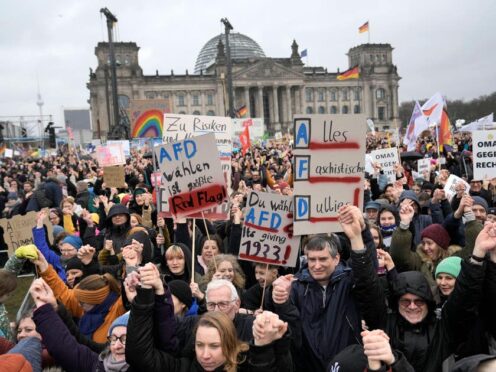
At least 150,000 people gathered in front of the German national parliament on Saturday afternoon to protest against the far right, the latest in a string of large weekend demonstrations across Germany.
The pro-democracy demonstrations started three weeks ago after the investigative journalists’ group Correctiv published an article saying that right-wing extremists had recently met to discuss deporting millions of immigrants, including some with German citizenship.
Some members of the far-right Alternative for Germany party (AfD) were present at the meeting.
Saturday’s protest drew more participants than organisers expected, despite intermittent rain showers in the German capital Berlin.

Police said that as of mid-afternoon on Saturday, approximately 150,000 people were in attendance.
Similar protests against the far right in other German cities, including the southern city of Freiburg and the western city of Hannover, also drew thousands of attendees on Saturday.
Under the slogan “We are the Firewall” – a reference to the longstanding taboo against collaborating with the far right in German politics – protesters turned the space next to the Bundestag, or national parliament, into a sea of signs, flags and umbrellas.
People travelled from across Germany to attend Saturday’s protest, saying they felt it was important to be there in order to show their opposition to racism and caution against repeating history.
“We absolutely must not allow the stories that we experienced in 1930 or even back in the 1920s to happen again … We must do everything we can to prevent that,” said Jonas Schmidt, who came from the western port city of Bremen.
“That’s why I’m here.”
Kathrin Zauter, another protester, called the strong attendance “really encouraging”.
“This encourages everyone and shows that we are more – we are many,” she said.

The AfD was founded as a Eurosceptic party in 2013 and first entered the Bundestag in 2017.
Recent polling put the party in second place nationally with support above 20%, far above the 10.3% of the vote it won during the last federal election in 2021.
Polls show AfD is the top party in eastern Germany, including in the states of Brandenburg, Saxony and Thuringia, which are scheduled to hold elections this autumn.
The demonstration on Saturday was the latest in a string of similar gatherings across the country, many of which have drawn far more participants than organisers expected.
In both Hamburg and Munich late last month, protests had to be ended early due to safety concerns with packing too many people into small spaces.
Although Germany has seen other protests against the far right in past years, the size and scope of the recent demonstrations – not just in major cities, but also in dozens of smaller cities across the country – are notable.
German Chancellor Olaf Scholz praised the protests, writing in a Saturday post on the social media platform X that citizens’ presence at the gatherings is “a strong sign for democracy and our constitution”.
“In small and big cities across the country, citizens are coming together to demonstrate against forgetting, against hate and incitement,” he added.

Enjoy the convenience of having The Sunday Post delivered as a digital ePaper straight to your smartphone, tablet or computer.
Subscribe for only £5.49 a month and enjoy all the benefits of the printed paper as a digital replica.
Subscribe